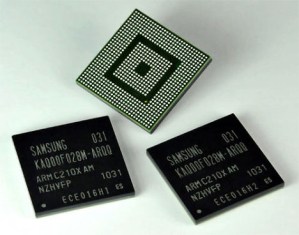
Samsung has had a hit on its hands with its Hummingbird mobile processors: they drive a wide range of Android devices (including Samsung’s own Galaxy S and Galaxy Tab devices), and aspects of the Hummingbird are part of the Apple A4 processor at the heard of the iPad and the iPhone 4. Samsung’s followup to the Hummingbird has been codenamed Orion, but today Samsung announced it’s not going to market with that name: instead, the chips will be marketed under the brand name Exynos, and Samsung says they will start shipping to equipment makers next month.
“Application processors for the mobile market are one of the flagship products in our semiconductor business,” said Samsung’s System LSI Division executive VP of marketing Seh-Woong Jeong, in a statement. “We are excited to introduce the brand name of Exynos for Samsung’s application processor family. As consumers demand more from their mobile products, Samsung’s Exynos chips will be the power inside enabling the coolest HD multi-media features with even longer battery life.”
South Korea’s Samsung is deriving the name Exynos from Greek: exypnos means “smart” and prasinos means “green,” so the company feels “Exynos” communicates a “smart and green” message.
The processor codenamed Orion will be renamed the Exynos 4210, and will feature dual Cortex A9 processing cores running at 1 GHz; the chip is expected to be handle a broader variety of rich media applications in mobile devices than current processors—including 1080p video at 30 frames per second. Some of its primarily competition will likely come from Apple’s own in-house processors, as well as new embedded chips from companies like Qualcomm. HP’s new TouchPad is driven by an Qualcomm APQ8060 SnapDragon processor, a previously un-announced CPU from Qualcomm.
Samsung announced the chip back in September, 2010.
Samsung originally developed the Hummingbird processor in conjunction with chip designer Intrinsity; Apple acquired Intrinsity about a year ago.


